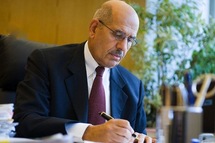Egypt activists keep up the heat, boosted by ElBaradei
Mona Salem
CAIRO, Mona Salem- Protests calling for the ouster of President Hosni Mubarak raged in Egypt for a third straight day on Thursday as leading dissident Mohamed ElBaradei returned home, offering to step into the breach.
As the deadly unrest continued, US President Barack Obama warned that violence was not the answer, urging restraint on both sides, and also pressing Mubarak to adopt political reforms.

Mohamed ElBaradei
"It is a critical time in the life of Egypt. I have come to participate with the Egyptian people," ElBaradei, a vocal critic of Mubarak, said before leaving Cairo airport.
Earlier, in Vienna, he told reporters he was ready to "lead the transition" in Egypt if asked.
"If people, in particular young people, if they want me to lead the transition I will not let them down. My priority right now is to see a new Egypt and to see a new Egypt through peaceful transition," he said.
"I am still here hoping to continue to manage the process of change in an orderly way, in a peaceful way. I hope the regime will do the same."
"I hope the regime will stop violence, stop detaining, stop torturing people."
The angry nationwide demonstrations have swelled into the largest uprising in three decades.
Seven people have been killed -- five protesters and two policemen -- and more than 100 injured.
And a security official told AFP around 1,000 people had been arrested since the protests began.
A heavy security clamp prevented protesters from massing in the centre of Cairo as they did on Tuesday and Wednesday, but clashes erupted in the cities of Suez and Ismailiya, and in a Sinai town where police shot dead a protester, witnesses said.
The demonstrations against Mubarak's autocratic rule, inspired by the "Jasmine Revolution" in Tunisia, have sent shockwaves across the region and prompted Washington to prod its long-time ally on democratic reforms.
Obama, in his first on-camera reaction to the demonstrations sweeping Egypt, said "violence is not the answer in solving these problems in Egypt."
In a YouTube question-and-answer session about his State of the Union address on Tuesday, he said "the government has to be careful about not resorting to violence. The people on the streets have to be careful about not resorting to violence."
He described the demonstrations as the result of "pent-up frustrations" of Egypt's people, and said he had always made clear to Mubarak it was "absolutely critical" for him to move towards political reform.
Earlier, White House spokesman Robert Gibbs had said: "We believe this represents an opportunity for President Mubarak and the government of Egypt to demonstrate its willingness to listen to its own people, to devise a way to broaden the discussion.
Events on the street rocked Egypt's stock exchange, which suspended trading temporarily on Thursday after a drop of 6.2 percent in the benchmark EGX 30 index, a day after it fell six percent. The market closed with a drop of over 10 percent.
Meanwhile, the secretary general of Egypt's ruling National Democratic Party told reporters Thursday the authorities are open to dialogue with the country's young people, who are spearheading demonstrations.
"We have held several meetings with the youth, but in the future we will be more understanding in our approach so that they can be participants," Sawfat al-Sherif told a news conference, without saying what he meant.
Earlier in the day, members of the pro-democracy youth group April 6 Movement said they would continue to take to the streets, defying a ban on demonstrations announced on Wednesday.
Activists circulated SMS messages and posted appeals on social networking site Facebook for fresh demonstrations "to demand the right to live with freedom and dignity."
"We've started and we won't stop," one demonstrator told AFP.
Clashes broke out in the north Sinai town of Sheikh Zuwayed where witnesses and relatives said a youth died when he was shot in the head by police during a firefight.
Protesters later fired two rockets at a police station in the town, but missed with one hitting a nearby medical centre, security officials said. There were no immediate reports of casualties.
An AFP correspondent reported protesters also fired an RPG at a police station three kilometres (two miles) from the town, setting it on fire. The checkpoint had been evacuated earlier in the day.
In Suez, east of Cairo at the mouth of the Suez Canal, police fired rubber-coated bullets, tear gas and water canon at hundreds of people gathered to demand the release of some 75 people arrested on Tuesday and Wednesday.
An AFP photographer said protesters later hurled Molotov cocktails at a fire station in the city, setting it ablaze.
In Ismailiya to the north, witnesses reported that police were firing tear gas at demonstrators, who responded by throwing rocks.
The protests are the largest in Egypt since bread riots in 1977, four years before Mubarak came to power.
Among protesters' demands are the departure of the interior minister, whose security forces have been accused of heavy-handedness; an end to a decades-old state of emergency; and a rise in minimum wages.
------------------------------------------------------------------------------